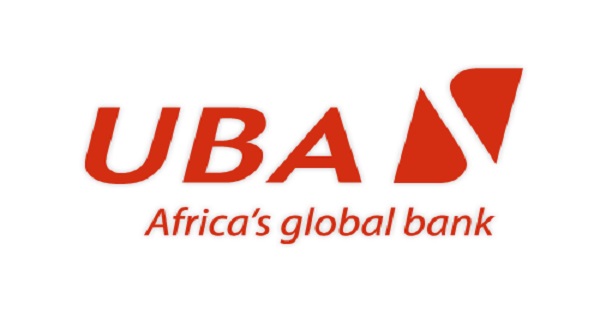E-Financial
UBA Deepens Retail Products, Services through Digital Channels across Africa

United Bank for Africa (UBA) Plc, Pan African financial services institution, has deepened its retail products and services with an aim to delivering services aimed at meeting the needs of its customers across Africa.

These services and product offerings, targeting at all classes of customers have been specifically tailored to meet the unique needs of individual customers of the bank, in line with the Customer First policy of the bank.
Ogechi Altraide, UBA’s head of Retail Liabilities, who spoke in a virtual international media parley with a diverse group of journalists and publishers from all over Africa, pointed out that UBA was well prepared ahead of the Covid-19 pandemic and had rolled-out a number of products that enabled customers to carry out their daily transactions with ease from the comfort of their homes.
She said, “At UBA, we have developed very deep and customer-centric solutions that have given us number one ranking over time. Our retail footprint cuts across 20 African countries, where we serve over 20 million customers through well researched platforms including over 20,000 POS as well as 3,000 ATMs deployed across the continent. We have well over 10 million active cards, while our very active and highly applauded Mobile App and USSD platforms serve several millions of subscribers every second.”
Continuing, Altraide said, “Our retail banking platforms cater to all ages and classes with the Kiddies and Teens Account – where parents can earn rewards and bonuses for saving for their kids, while also enjoying support in terms of scholarships and health insurance; Next Gen Account – which caters for young adults; Mass Marketing segment – made up of low to mid income earners; Affluent Banking for the premium banking experience as well as SME banking, which caters to meeting the needs of a niche industry essential for the growth of any economy.”
Throwing more light on the bank’s increasing support for the MSMEs, she explained that the bank offers both financial and non-financial services to this all-important sector as well as access to loans, adding that “At UBA, we recognise that SMEs are important to economic growth, therefore our various offerings for MSMEs is positioned to support them in this regard.”
Altraide noted that other retail propositions the bank has developed to promote financial inclusion are Diaspora Banking where customers can enjoy the same quality of services in all locations around the world through UBA Connect and Africash; and Agency Banking, which makes use of digital channels that allow customers to access UBA banking services right in their neighborhoods from our dedicated Agents.
Apart from UBA mobile banking, USSD, internet banking and LEO – UBA’s virtual assistant other innovative platforms that drive the bank’s retail business include UBA’s Click Credit – a much loved and accepted facility that makes instant cash available to customers with salary accounts within minutes.
Altraide added that already, over 50,000 people have benefited from the facility, adding that customers can access up to N5m in a matter of seconds.
United Bank for Africa Plc is a leading Pan-African financial institution, offering banking services to more than twenty million customers, across over 1,000 business offices and customer touch points, in 20 African countries.
With presence in the United States of America, the United Kingdom and France, UBA is connecting people and businesses across Africa through retail; commercial and corporate banking; innovative cross-border payments and remittances; trade finance and ancillary banking services.
E-Financial
Nigerian Banks End Years of Embargo, Resume Intl Transactions on Naira Cards

Nigerian banks have resumed international transactions on naira-denominated debit cards, marking a significant shift in banking operations for customers who rely on foreign payments.

This is coming nearly three years of suspension.
United Bank for Africa (UBA) and Wema Bank, in separate communications to their customers, announced the restoration of international payment services on their naira cards.
In a notice to its customers, UBA said the reactivation of international transactions on its premium naira cards aligns with its commitment to delivering improved and seamless banking experiences.
“We are pleased to inform you that all UBA Premium Naira Cards, including Gold, Platinum, and World variants, are now enabled for international transactions,” the bank stated.
“This means you can now use your Premium Naira Card for global payments — including online shopping, POS, and ATM transactions — with ease and flexibility. If you haven’t used your card recently, now is a great time to rediscover the convenience and prestige that comes with being a UBA premium cardholder.”
Similarly, Wema Bank announced that its customers can now make dollar payments on international platforms using their naira Mastercards.
“Your Wema Naira Mastercard just went global!” the bank said. “Now you can pay in dollars on all your favourite international platforms — Amazon, eBay, AliExpress, Netflix, Spotify, YouTube.”
The development marks a major relief for Nigerian customers who have had to rely on dollar cards or alternative payment methods since most banks suspended international usage of naira cards in 2021 due to foreign exchange scarcity.
E-Financial
Flutterwave Secures 20 more US Money Transmitter Licences

Flutterwave, Africa’s leading payments technology company, today announced the relaunch of its flagship remittance solution, Send App, across U.S. states following its newly acquired Money Transmitter Licences (MTLs).

This comes after Flutterwave secured 20 additional MTLs in the U.S., adding to the 14 licenses the brand has held since 2023.
Altogether, this achievement raises Flutterwave’s total number of direct licenses to 34, allowing the company to operate across many U.S. states and territories without partners or intermediaries.
Users in the U.S. can now send money to Nigeria, Ghana and Egypt, unlocking new remittance corridors that were previously unavailable.
Alongside this expansion, the onboarding process has been streamlined with a quick ID check, making it faster and easier for new users to get started.
Additional improvements include optimised payment support for US-issued Visa and Discover cards, enhanced security measures to safeguard transactions and maintain compliance, and improved in-app flows for a simpler, more efficient sending experience.
This return also highlights Flutterwave’s commitment to delivering a seamless, secure, and regulatory-compliant user experience for all Send App customers in the U.S. Users can now send money from DC, Georgia, Maryland, North Carolina, Michigan, South Carolina, Tennessee.
Other U.S. states and territories where Send App by Flutterwave supports outward remittances include Alaska, Arizona, Arkansas, Delaware, Idaho, Illinois, Indiana, Iowa, Louisiana, Maine, Minnesota, Mississippi, and Missouri, Nebraska, New Hampshire, New Mexico, North Dakota, Oklahoma, Oregon, Puerto Rico, Rhode Island, South Dakota, Utah, Washington, West Virginia, Wisconsin, and Wyoming.
Commenting on the relaunch, Olugbenga “GB” Agboola, Flutterwave Founder and CEO, said, “By expanding our reach and enhancing our services, we are empowering millions of Africans in the U.S. to maintain strong financial ties with their home countries, support their families, and contribute to economic development across the continent. Additionally, we are staying true to our core mission of bridging Africa with the global economy and vice versa.”
Earlier this year, Flutterwave integrated Swap into Send App for seamless FX transactions and strengthened its services in Ghana by securing approval for inward remittance from the Bank of Ghana.
E-Financial
Court Affirms NIBSS Authority to Manage BVN

Federal High Court in Abuja on Friday affirmed the authority of the Nigeria Inter-Bank Settlement System (NIBSS), to manage the Bank Verification Number (BVN), database across the country, in line with the Central Bank of Nigeria (CBN), Act and other relevant banking laws.

This is according to a judgment delivered by Justice James Omotosho on Friday.
Wolemi Esan, senior advocate of Nigeria, NIBSS’s counsel, and Kofo Abdulsalam-Alada, lead counsel for the CBN, among others, had sought a restraining order to prevent any institution in Nigeria from challenging the agency’s statutory authority to maintain and manage the BVN database.
This comes as NIBSS had alleged that Digital Rights Lawyers Initiative filed multiple suits, either directly or through proxies, challenging its authority to manage the BVN database and claiming that such management violates constitutional privacy rights.
However, Justice Omotosho, delivering his judgment, said the BVN does not infringe on the constitutional right to privacy.
“The initiative does not infringe on the constitutional right to privacy but rather serves as a necessary tool for safeguarding public interest and enhancing financial security.
“NIBSS has the power to manage the BVN,” the judge said, citing relevant CBN laws.
“The court grants the reliefs of NIBSS as prayed,” he stated.

 E-Financial2 days ago
E-Financial2 days agoCourt Affirms NIBSS Authority to Manage BVN

 Telecom2 days ago
Telecom2 days agoMTN, 9mobile Commence Ground-breaking National Infrastructure Partnership

 E-Financial2 days ago
E-Financial2 days agoNigerian Banks End Years of Embargo, Resume Intl Transactions on Naira Cards

 General News2 days ago
General News2 days agoCybervergent Selected as World Economic Forum’s 2025 Technology Pioneer Company

 E-Business2 days ago
E-Business2 days agoNIMC Says NIN Services Back Online

 Telecom2 days ago
Telecom2 days agoKarl Toriola Champions Digital Education for Employability @Sigma Club Lecture

 E-Business2 days ago
E-Business2 days agoReport Reveals African Organizations Dangerously Overestimating Cyber defences

 E-Financial2 days ago
E-Financial2 days agoFlutterwave Secures 20 more US Money Transmitter Licences























